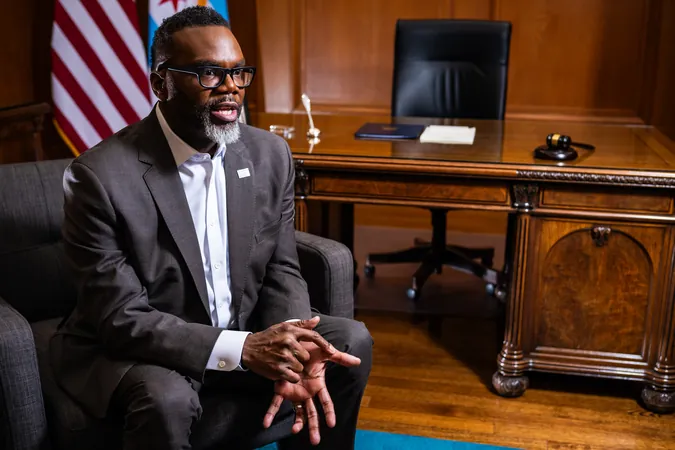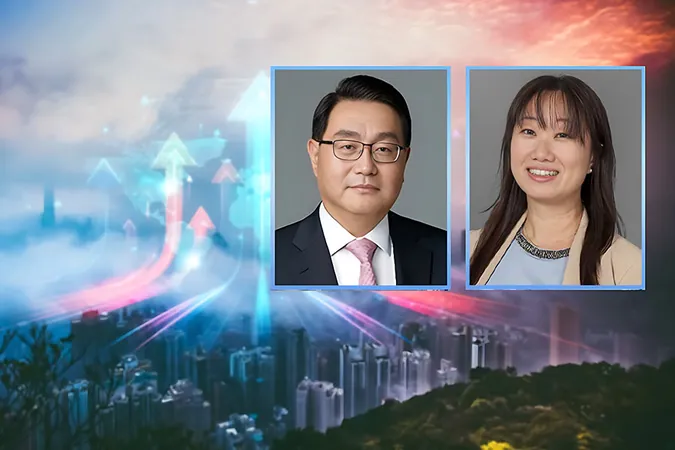
Chicago Mayor Considers Congestion Pricing Amidst Traffic Woes and Budget Challenges
2025-01-07
Author: Wei
Introduction
In a surprising pivot, Chicago Mayor Brandon Johnson has shifted his stance on launching a city-run grocery store, instead directing his focus toward the possibility of implementing a congestion pricing system similar to New York City's. This revelation comes during a crucial time as the mayor navigates the complexities of the 2025 budget process and seeks collaboration from a City Council that has recently shown defiance.
Key Initiatives for 2025
In a candid interview, Johnson emphasized his administration's commitment to several key initiatives for 2025, such as expanding youth hiring programs, increasing affordable housing, and enhancing public health resources. A notable part of his vision includes establishing a 911 response model that deploys mental health professionals to respond to non-violent incidents—a critical approach to addressing the city's mental health crisis.
Food Accessibility Strategy
Despite earlier intentions to open a city-run grocery store aimed at combating food inequity—an issue deeply rooted in Chicago's South and West sides—Johnson has now opted to partner with local grocery businesses instead. This decision follows disappointment over the administration's failure to secure a state grant for the proposed grocery store, an oversight that has caused concern among community activists focused on providing healthier food options in underserved areas.
The alternative, partnering with existing local grocers, has been positioned as a more viable solution for addressing food deserts throughout the city. "Stakeholders expressed their desire for us to collaborate with companies that align with our vision," Johnson stated, signaling a shift in strategy to address food accessibility issues.
Addressing Traffic Congestion
Turning to traffic problems, Johnson's consideration of a New York-style congestion pricing plan sparked interest, particularly as Chicago grapples with some of the worst traffic congestion in the world—ranking alongside New York City and closely following Istanbul. With the average Chicagoan reportedly spending a staggering 102 hours in traffic in 2024, the mayor views the exploration of a congestion fee as a potential avenue for reducing gridlock and generating revenue from non-resident drivers who frequently utilize city resources.
"As we address congestion, we must have in-depth conversations about how Chicago can generate revenue from those who benefit from our infrastructure," Johnson remarked during the interview, emphasizing the importance of accountability for drivers who do not contribute to the city's tax base.
Public Support and Input
The potential implementation of congestion pricing reflects a broader trend among major metropolitan areas aiming to alleviate urban traffic issues and fund public transit initiatives. Johnson's administration aims to gather public support and input on this proposal, ensuring it aligns with the needs of Chicagoans.
Commitment to Immigrant Welfare
Amid these developments, Johnson has also reiterated his commitment to protecting Chicago's designation as a "welcoming city" for immigrants, despite pressures from federal authorities. With immigration reform stagnant for over three decades, the mayor's stance reaffirms a commitment to local laws that prioritize community welfare over federal immigration policies.
Conclusion
As Chicago navigates these challenges, the mayor's ability to secure the necessary backing from the City Council and the public will be crucial in shaping the future of the city’s transportation, housing, and health resources. As traffic congestion escalates and budget constraints loom, all eyes will be on Johnson as he proposes transformative measures aimed at enhancing the livelihoods of all Chicagoans.


 Brasil (PT)
Brasil (PT)
 Canada (EN)
Canada (EN)
 Chile (ES)
Chile (ES)
 Česko (CS)
Česko (CS)
 대한민국 (KO)
대한민국 (KO)
 España (ES)
España (ES)
 France (FR)
France (FR)
 Hong Kong (EN)
Hong Kong (EN)
 Italia (IT)
Italia (IT)
 日本 (JA)
日本 (JA)
 Magyarország (HU)
Magyarország (HU)
 Norge (NO)
Norge (NO)
 Polska (PL)
Polska (PL)
 Schweiz (DE)
Schweiz (DE)
 Singapore (EN)
Singapore (EN)
 Sverige (SV)
Sverige (SV)
 Suomi (FI)
Suomi (FI)
 Türkiye (TR)
Türkiye (TR)
 الإمارات العربية المتحدة (AR)
الإمارات العربية المتحدة (AR)